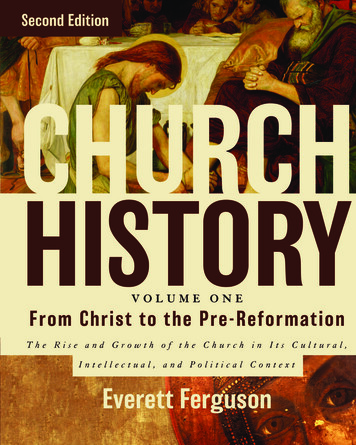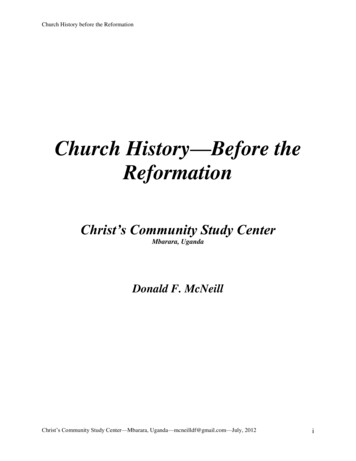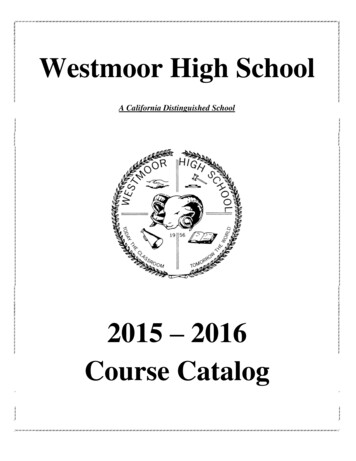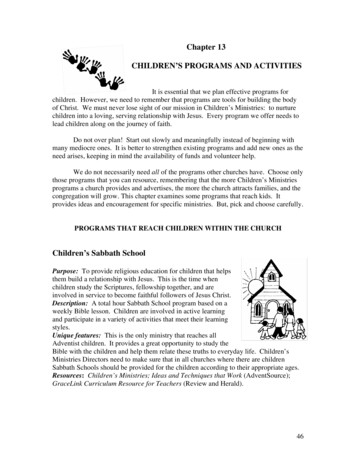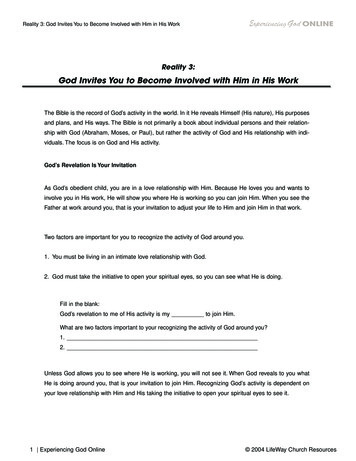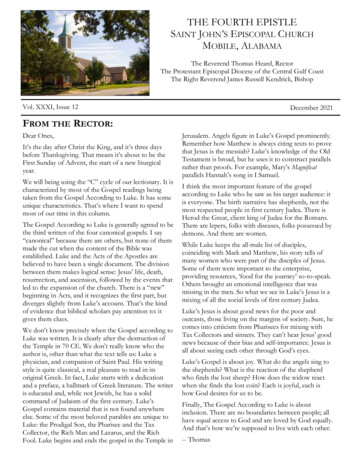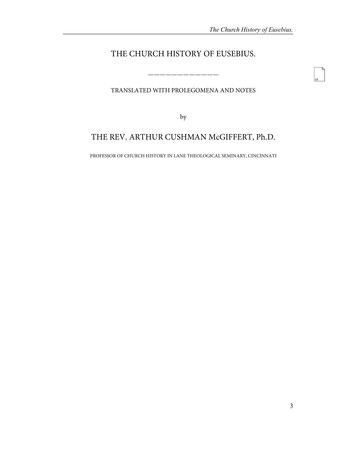
Transcription
The Church History of Eusebius.THE CHURCH HISTORY OF ANSLATED WITH PROLEGOMENA AND NOTESbyTHE REV. ARTHUR CUSHMAN McGIFFERT, Ph.D.PROFESSOR OF CHURCH HISTORY IN LANE THEOLOGICAL SEMINARY, CINCINNATI3
��ixThe present translation of the Church History of Eusebius has been made from Heinichen’s second edition of the Greek text, but variant readings have been adopted withouthesitation whenever they have approved themselves to my judgment. In all such cases thevariation from Heinichen’s text has been indicated in the notes. A simple revision of Crusè’sEnglish version was originally proposed, but a brief examination of it was sufficient toconvince me that a satisfactory revision would be an almost hopeless task, and that nothingshort of a new and independent translation ought to be undertaken. In the preparation ofthat translation, invaluable assistance has been rendered by my father, the Rev. Joseph N.McGiffert, D.D., for whose help and counsel I desire thus publicly to give expression to myprofound gratitude. The entire translation has been examined by him and owes much tohis timely suggestions and criticisms; while the translation itself of a considerable portionof the work (Bks. V.–VIII. and the Martyrs of Palestine) is from his hand. The part thusrendered by him I have carefully revised for the purpose of securing uniformity in style andexpression throughout the entire work, and I therefore hold myself alone responsible for itas well as for the earlier and later books. As to the principle upon which the translation hasbeen made, little need be said. The constant endeavor has been to reproduce as nearly aspossible, both the substance and form of the original, and in view of the peculiar need ofaccuracy in such a work as the present, it has seemed better in doubtful cases to run the riskof erring in the direction of over-literalness rather than in that of undue license.A word of explanation in regard to the notes which accompany the text may not be outof place. In view of the popular character of the series of which the present volume forms apart, it seemed important that the notes should contain much supplementary informationin regard to persons, places, and events mentioned in the text which might be quite superfluous to the professional historian as well as to the student enjoying access to libraries richin historical and bibliographical material, and I have therefore not felt justified in confiningmyself to such questions as might interest only the critical scholar. Requested by the generaleditor to make the work in some sense a general history of, or historical commentary upon,the first three centuries of the Christian Church, I have ventured to devote considerablespace to a fuller presentation of various subjects but briefly touched upon or merely referredto by Eusebius. At the same time my chief endeavor has been, by a careful study of difficultand disputed points, to do all that I could for their elucidation, and thus to perform asfaithfully as possible the paramount duty of a commentator. The number and fulness of thenotes needed in such a work must of course be matter of dispute, but annoyed as I have repeatedly been by the fragmentary character of the annotations in the existing editions ofthe work, I have been anxious to avoid that defect, and have therefore passed by no passage4
Preface.which seemed to me to need discussion, nor consciously evaded any difficulty. Workingwith historical students constantly in mind I have felt it due to them to fortify all my statements by references to the authorities upon which they have been based, and to indicate atthe same time with sufficient fullness the sources whose examination a fuller investigationof the subject on their part might render necessary. The modern works which have beenmost helpful are mentioned in the notes, but I cannot in justice refrain from making especial reference at this point to Smith and Wace’s Dictionary of Christian Biography whichhas been constantly at my side, and to the first and second volumes of Schaff’s Church History,whose bibliographies have been especially serviceable. Many of Valesius’ notes have beenfound very suggestive and must always remain valuable in spite of the great advance madein historical knowledge since his day. For the commentary of Heinichen less can be said.Richardson’s Bibliographical Synopsis, published as a supplement to the Ante-Nicene Library,did not come into my hands until the greater part of the work was completed. In the preparation of the notes upon the latter portion it proved helpful, and its existence has enabledme throughout the work to omit extended lists of books which it would otherwise have beennecessary to give.It was my privilege some three years ago to study portions of the fourth and fifth booksof Eusebius’ Church History with Professor Adolf Harnack in his Seminar at Marburg. Especial thanks are due for the help and inspiration gained from that eminent scholar, andfor the light thrown by him upon many difficult passages in those portions of the work.It gives me pleasure also to express my obligation to Dr. Isaac G. Hall, of New York,and to Dr. E. C. Richardson, of Hartford, for information furnished by them in regard tocertain editions of the History, also to the Rev. Charles R. Gillett, Librarian of UnionTheological Seminary, and to the Rev. J. H. Dulles, Librarian of Princeton TheologicalSeminary, for their kindness in granting me the privileges of the libraries under their charge,and for their unfailing courtesy shown me in many ways. To Mr. James McDonald, ofShelbyville, Ky., my thanks are due for his translation of the Testimonies for and againstEusebius, printed at the close of the Prolegomena, and to Mr. F. E. Moore, of New Albany,Ind., for assistance rendered in connection with the preparation of the indexes.ARTHUR CUSHMAN McGIFFERT.Lane Theological Seminary,April 15, 1890.5x
Prolegomena.Prolegomena.3THE LIFE AND WRITINGS OFEUSEBIUS OF CÆSAREA.6
The Life of Eusebius.CHAPTER IThe Life of Eusebius.§ 1. Sources and LiteratureAcacius, the pupil and successor of Eusebius in the bishopric of Cæsarea, wrote a lifeof the latter (Socr. H. E. II. 4) which is unfortunately lost. He was a man of ability (SozomenH. E. III. 2, IV. 23) and had exceptional opportunities for producing a full and accurate account of Eusebius’ life; the disappearance of his work is therefore deeply to be regretted.Numerous notices of Eusebius are found in the works of Socrates, Sozomen, Theodoret,Athanasius, Jerome, and other writers of his own and subsequent ages, to many of whichreferences will be made in the following pages. A collection of these notices, made byValesius, is found in English translation on p. 57 sq. of this volume. The chief source for aknowledge of Eusebius’ life and character is to be found in his own works. These will bediscussed below, on p. 26 sq. Of the numerous modern works which treat at greater or lesslength of the life of Eusebius I shall mention here only those which I have found mostvaluable.Valesius: De vita scriptisque Eusebii Diatribe (in his edition of Eusebius’ Historia Eccles.;English version in Cruse’s translation of the same work).Cave: Lives of the Fathers, II. 95–144 (ed. H. Cary, Oxf. 1840).Tillemont: Hist. Eccles. VII. pp. 39–75 (compare also his account of the Arians in vol.VI.).Stroth: Leben und Schriften des Eusebius (in his German translation of the Hist. Eccles.).Closs: Leben und Schriften des Eusebius (in his translation of the same work).Danz: De Eusebio Cæsariensi, Historiæ Eccles. Scriptore, ejusque fide historica recte æstimanda, Cap. II.: de rebus ad Eusebii vitam pertinentibus (pp. 33–75).Stein: Eusebius Bischof von Cæsarea. Nach seinem Leben, seinen Schriften, und seinemdogmatischen Charakter dargestellt (Würzburg, 1859; full and valuable).Bright, in the introduction to his edition of Burton’s text of the Hist. Eccles. (excellent).Lightfoot (Bishop of Durham): Eusebius of Cæsarea, in Smith and Wace’s Dictionary ofChristian Biography, vol. II. pp. 308–348. Lightfoot’s article is a magnificent monument ofpatristic scholarship and contains the best and most exhaustive treatment of the life andwritings of Eusebius that has been written.The student may be referred finally to all the larger histories of the Church (e.g. Schaff,vol. III. 871 sqq. and 1034 sq.), which contain more or less extended accounts of Eusebius.7
Eusebius' Birth and Training. His Life in Cæsarea until the Outbreak of §2. Eusebius’ Birth and Training. His Life in Cæsarea until the Outbreak of the Persecution.Our author was commonly known among the ancients as Eusebius of Cæsarea or Eusebius Pamphili. The former designation arose from the fact that he was bishop of the churchin Cæsarea for many years; the latter from the fact that he was the intimate friend and devotedadmirer of Pamphilus, a presbyter of Cæsarea and a martyr. Some such specific appellationwas necessary to distinguish him from others of the same name. Smith and Wace’s Dictionaryof Christian Biography mentions 137 men of the first eight centuries who bore the nameEusebius, and of these at least forty were contemporaries of our author. The best knownamong them were Eusebius of Nicomedia (called by Arius the brother of Eusebius ofCæsarea), Eusebius of Emesa, and Eusebius of Samosata.The exact date of our author’s birth is unknown to us, but his Ecclesiastical Historycontains notices which enable us to fix it approximately. In H. E. V. 28 he reports that Paulof Samosata attempted to revive again in his day (καθ ἡμᾶς) the heresy of Artemon. ButPaul of Samosata was deposed from the episcopate of Antioch in 272, and was condemnedas a heretic at least as early as 268, so that Eusebius must have been born before the latterdate, if his words are to be strictly interpreted. Again, according to H. E. III. 28, Dionysiuswas bishop of Alexandria in Eusebius’ time (καθ ἡμᾶς). But Dionysius was bishop from247 or 248 to 265, and therefore if Eusebius’ words are to be interpreted strictly here as inthe former case, he must have been born before 265. On the other hand, inasmuch as hisdeath occurred about 340, we cannot throw his birth much earlier than 260. It is true thatthe references to Paul and to Dionysius do not prove conclusively that Eusebius was alivein their day, for his words may have been used in a loose sense. But in H. E. VII. 26, justbefore proceeding to give an account of Paul of Samosata, he draws the line between hisown and the preceding generation, declaring that he is now about to relate the events of hisown age (τὴν καθ ἡμᾶς). This still further confirms the other indications, and we shallconsequently be safe in concluding that Eusebius was born not far from the year 260 a.d.His birthplace cannot be determined with certainty. The fact that he is called “Eusebius thePalestinian” by Marcellus (Euseb. lib. adv. Marcell. I. 4), Basil (Lib. ad. Amphil. de Spir.Sancto, c. 29), and others, does not prove that he was a Palestinian by birth; for the epithetmay be used to indicate merely his place of residence (he was bishop of Cæsarea in Palestinefor many years). Moreover, the argument urged by Stein and Lightfoot in support of hisPalestinian birth, namely, that it was customary to elect to the episcopate of any church anative of the city in preference to a native of some other place, does not count for much. Allthat seems to have been demanded was that a man should have been already a member ofthe particular church over which he was to be made bishop, and even this rule was notuniversal (see Bingham’s Antiquities, II. 10, 2 and 3). The fact that he was bishop of Cæsareatherefore would at most warrant us in concluding only that he had made his residence inCæsarea for some time previous to his election to that office. Nevertheless, although neither84
Eusebius' Birth and Training. His Life in Cæsarea until the Outbreak of of these arguments proves his Palestinian birth, it is very probable that he was a native ofthat country, or at least of that section. He was acquainted with Syriac as well as with Greek,which circumstance taken in connection with his ignorance of Latin (see below, p. 47) pointsto the region of Syria as his birthplace. Moreover, we learn from his own testimony that hewas in Cæsarea while still a youth (Vita Constantini, I. 19), and in his epistle to the churchof Cæsarea (see below, p. 16) he says that he was taught the creed of the Cæsarean churchin his childhood (or at least at the beginning of his Christian life: ἐν τῇ κατηχήσει), and thathe accepted it at baptism. It would seem therefore that he must have lived while still a childeither in Cæsarea itself, or in the neighborhood, where its creed was in use. Although noone therefore (except Theodorus Metochita of the fourteenth century, in his Cap. Miscell.17; Migne, Patr. Lat. CXLIV. 949) directly states that Eusebius was a Palestinian by birth,we have every reason to suppose him such.His parents are entirely unknown. Nicephorus Callistus (H. E. VI. 37) reports that hismother was a sister of Pamphilus. He does not mention his authority for this statement,and it is extremely unlikely, in the face of the silence of Eusebius himself and of all otherwriters, that it is true. It is far more probable that the relationship was later assumed to account for the close intimacy of the two men. Arius, in an epistle addressed to Eusebius ofNicomedia (contained in Theodoret’s Hist. Eccles. I. 5), calls Eusebius of Cæsarea the latter’sbrother. It is objected to this that Eusebius of Nicomedia refers to Eusebius of Cæsarea onone occasion as his “master” (τοῦ δεσπότου μου, in his epistle to Paulinus contained inTheodoret’s Hist. Eccles. I. 6), and that on the other hand Eusebius of Cæsarea calls Eusebiusof Nicomedia, “the great Eusebius” (Euseb. lib. adv. Marcell. I. 4), both of which expressionsseem inconsistent with brotherhood. Lightfoot justly remarks that neither the argument itselfnor the objections carry much weight. The term ἀδελφός may well have been used to indicatemerely theological or ecclesiastical association, while on the other hand, brotherhood wouldnot exclude the form of expression employed by each in speaking of the other. Of moreweight is the fact that neither Eusebius himself nor any historian of that period refers tosuch a relationship, and also the unlikelihood that two members of one family should bearthe same name.From Eusebius’ works we gather that he must have received an extensive educationboth in secular philosophy and in Biblical and theological science. Although his immenseerudition was doubtless the result of wide and varied reading continued throughout life, itis highly probable that he acquired the taste for such reading in his youth. Who his earlyinstructors were we do not know, and therefore cannot estimate the degree of their influenceover him. As he was a man, however, who cherished deep admiration for those whom heregarded as great and good men, and as he possessed an unusually acquisitive mind and apliant disposition, we should naturally suppose that his instructors must have possessedconsiderable influence over him, and that his methods of study in later years must have95
Eusebius' Birth and Training. His Life in Cæsarea until the Outbreak of been largely molded by their example and precept. We see this exemplified in a remarkabledegree in the influence exerted over him by Pamphilus, his dearest friend, and at the sametime the preceptor, as it were, of his early manhood. Certainly this great bibliopholist musthave done much to strengthen Eusebius’ natural taste for omnivorous reading, and the opportunities afforded by his grand library for the cultivation of such a taste were not lost. Tothe influence of Pamphilus, the devoted admirer and enthusiastic champion of Origen, wasdoubtless due also in large measure the deep respect which Eusebius showed for that illustrious Father, a respect to which we owe one of the most delightful sections of his ChurchHistory, his long account of Origen in the sixth book, and to which in part antiquity wasindebted for the elaborate Defense of Origen, composed by Pamphilus and himself, but unfortunately no longer extant. Eusebius certainly owed much to the companionship of thateager student and noble Christian hero, and he always recognized with deep gratitude hisindebtedness to him. (Compare the account of Pamphilus given below in Bk. VII. chap. 32,§25 sq.) The names of his earlier instructors, who were eminently successful, at least in fostering his thirst for knowledge, are quite unknown to us. His abiding admiration for Plato,whom he always placed at the head of all philosophers (see Stein, p. 6), would lead us tothink that he received at least a part of his secular training from some ardent Platonist, whilehis intense interest in apologetics, which lasted throughout his life, and which affected allhis works, seems to indicate the peculiar bent of his early Christian education. Trithemiusconcluded from a passage in his History (VII. 32) that Eusebius was a pupil of the learnedDorotheus of Antioch, and Valesius, Lightfoot and others are apparently inclined to accepthis conclusion. But, as Stroth remarks (Eusebii Kirchengeschichte, p. xix), all that Eusebiussays is that he had heard Dorotheus expound the Scriptures in the church (τούτου μετρίωςτὰς γραφὰς ἐπὶ τῆς ἐκκλησίας διηγουμένου κατηκούσαμεν), that is, that he had heard himpreach. To conclude from this statement that he was a pupil of Dorotheus is certainly quiteunwarranted.Stroth’s suggestion that he probably enjoyed the instruction of Meletius for seven yearsduring the persecution rests upon no good ground, for the passage which he relies upon tosustain his opinion (H. E. VII. 32. 28) says only that Eusebius “observed Meletius well”(κατενοήσαμεν) during those seven years.In Cæsarea Eusebius was at one time a presbyter of the church, as we may gather fromhis words in the epistle to that church already referred to, where, in speaking of the creed,he says, “As we believed and taught in the presbytery and in the episcopate itself.” But theattempt to fix the date of his ordination to that office is quite vain. It is commonly assumedthat he became presbyter while Agapius was bishop of Cæsarea, and this is not unlikely,though we possess no proof of it (upon Agapius see below, H. E. VII. 32, note 39). In hisVita Constantini, I. 19, Eusebius reports that he saw Constantine for the first time in Cæsareain the train of the Emperor Diocletian. In his Chron. Eusebius reports that Diocletian made106
Eusebius' Birth and Training. His Life in Cæsarea until the Outbreak of an expedition against Egypt, which had risen in rebellion in the year 296 a.d., and Theophanes, in his Chron., says that Constantine accompanied him. It is probable therefore thatit was at this time that Eusebius first saw Constantine in Cæsarea, when he was either onhis way to Egypt, or on his way back (see Tillemont’s Hist. des Emp., IV. p. 34).During these years of quiet, before the great persecution of Diocletian, which broke outin 303 a.d., Eusebius’ life must have been a very pleasant one. Pamphilus’ house seems tohave been a sort of rendezvous for Christian scholars, perhaps a regular divinity school; forwe learn from Eusebius’ Martyrs in Palestine (Cureton’s edition, pp. 13 and 14) that he anda number of others, including the martyr Apphianus, were living together in one house atthe time of the persecution, and that the latter was instructed in the Scriptures by Pamphilusand acquired from him virtuous habits and conduct. The great library of Pamphilus wouldmake his house a natural center for theological study, and the immense amount of workwhich was done by him, or under his direction, in the reproduction of copies of the HolyScriptures, of Origen’s works (see Jerome’s de vir. ill. 75 and 81, and contra Ruf. I. 9), andin other literary employments of the same kind, makes it probable that he had gatheredabout him a large circle of friends and students who assisted him in his labors and profitedby his counsel and instruction. Amidst these associations Eusebius passed his early manhood,and the intellectual stimulus thus given him doubtless had much to do with his future career.He was above all a literary man, and remained such to the end of his life. The pleasantcompanionships of these days, and the mutual interest and sympathy which must havebound those fellow-students and fellow-disciples of Pamphilus very close together, perhapshad much to do with that broad-minded spirit of sympathy and tolerance which so characterized Eusebius in later years. He was always as far as possible from the character of a recluse.He seems ever to have been bound by very strong ties to the world itself and to his fellowmen. Had his earlier days been filled with trials and hardships, with the bitterness of disappointed hopes and unfulfilled ambitions, with harsh experiences of others’ selfishness andtreachery, who shall say that the whole course of his life might not have been changed, andhis writings have exhibited an entirely different spirit from that which is now one of theirgreatest charms? Certainly he had during these early years in Cæsarea large opportunitiesfor cultivating that natural trait of admiration for other men, which was often so strong asto blind him even to their faults, and that natural kindness which led him to see goodwherever it existed in his Christian brethren. At the same time these associations must havehad considerable influence in fostering the apologetic temper. The pursuits of the little circlewere apparently exclusively Christian, and in that day when Christianity stood always onits defense, it would naturally become to them a sacred duty to contribute to that defenseand to employ all their energies in the task. It has been remarked that the apologetic temperis very noticeable in Eusebius’ writings. It is more than that; we may say indeed in generalterms that everything he wrote was an apology for the faith. His History was written avowedly11
Eusebius' Birth and Training. His Life in Cæsarea until the Outbreak of with an apologetic purpose, his Chronicle was composed with the same end in view. Evenwhen pronouncing a eulogy upon a deceased emperor he seized every possible opportunityto draw from that emperor’s career, and from the circumstances of his reign, arguments forthe truth and grandeur of the Christian religion. His natural temper of mind and his earlytraining may have had much to do with this habit of thought, but certainly those years withPamphilus and his friends in Cæsarea must have emphasized and developed it.Another characteristic which Pamphilus and the circle that surrounded him doubtlessdid something to develop in our author was a certain superiority to the trammels of meretraditionalism, or we might perhaps better say that they in some measure checked the opposite tendency of slavishness to the traditional which seems to have been natural to him.Pamphilus’ deep reverence for Origen proclaims him at once superior to that kind of narrowconservatism which led many men as learned and doubtless as conscientious as himself topass severe and unconditional condemnation upon Origen and all his teaching. The effectof championing his cause must have fostered in this little circle, which was a very hotbedof Origenism, a contempt for the narrow and unfair judgments of mere traditionalists, andmust have led them to seek in some degree the truth solely for its own sake, and to becomein a measure careless of its relation to the views of any school or church. It could hardly beotherwise than that the free and fearless spirit of Origen should leave its impress throughhis writings upon a circle of followers so devoted to him as were these Cæsarean students.Upon the impressionable Eusebius these influences necessarily operated. And yet he broughtto them no keen speculative powers, no deep originality such as Origen himself possessed.His was essentially an acquisitive, not a productive mind, and hence it was out of the questionthat he should become a second Origen. It was quite certain that Origen’s influence overhim would weaken somewhat his confidence in the traditional as such,—a confidence whichis naturally great in such minds as his,—but at the same time would do little to lessen thereal power of the past over him. He continued to get his truth from others, from the greatmen of the past with whom he had lived and upon whose thought he had feasted. All thathe believed he had drawn from them; he produced nothing new for himself, and his creedwas a traditional creed. And yet he had at the same time imbibed from his surroundingsthe habit of questioning and even criticising the past, and, in spite of his abiding respect forit, had learned to feel that the voice of the many is not always the voice of truth, and thatthe widely and anciently accepted is sometimes to be corrected by the clearer sight of a singleman. Though he therefore depended for all he believed so completely upon the past, hisassociations had helped to free him from a slavish adherence to all that a particular schoolhad accepted, and had made him in some small measure an eclectic in his relations to doctrines and opinions of earlier generations. A notable instance of this eclecticism on his partis seen in his treatment of the Apocalypse of John. He felt the force of an almost universaltradition in favor of its apostolic origin, and yet in the face of that he could listen to the127
Eusebius' Birth and Training. His Life in Cæsarea until the Outbreak of doubts of Dionysius, and could be led by his example, in a case where his own dissatisfactionwith the book acted as an incentive, almost, if not quite, to reject it and to ascribe it to another John. Instances of a similar mode of conduct on his part are quite numerous. Whilehe is always a staunch apologist for Christianity, he seldom, if ever, degenerates into a merepartisan of any particular school or sect.One thing in fact which is particularly noticeable in Eusebius’ works is the comparativelysmall amount of time and space which he devotes to heretics. With his wide and variedlearning and his extensive acquaintance with the past, he had opportunities for successfulheresy hunting such as few possessed, and yet he never was a heresy hunter in any sense.This is surprising when we remember what a fascination this employment had for so manyscholars of his own age, and when we realize that his historical tastes and talents would seemto mark him out as just the man for that kind of work. May it not be that the lofty spirit ofOrigen, animating that Cæsarean school, had something to do with the happy fact that hebecame an apologist instead of a mere polemic, that he chose the honorable task of writinga history of the Church instead of anticipating Epiphanius’ Panarium?It was not that he was not alive to the evils of heresy. He shared with nearly all goodchurch-men of his age an intense aversion for those who, as he believed, had corrupted thetrue Gospel of Christ. Like them he ascribed heresy to the agency of the evil one, and wasno more able than they to see any good in a man whom he looked upon as a real heretic, orto do justice in any degree to the error which he taught. His condemnations of heretics inhis Church History are most severe. Language is hardly strong enough to express his aversionfor them. And yet, although he is thus most thoroughly the child of his age, the differencebetween him and most of his contemporaries is very apparent. He mentions these hereticsonly to dismiss them with disapproval or condemnation. He seldom, if ever, discusses andrefutes their views. His interests lie evidently in other directions; he is concerned withhigher things. A still more strongly marked difference between himself and many churchmenof his age lies in his large liberality towards those of his own day who differed with him inminor points of faith, and his comparative indifference to the divergence of views betweenthe various parties in the Church. In all this we believe is to be seen not simply the inherentnature of the man, but that nature as trained in the school of Pamphilus, the disciple ofOrigen.138
The Persecution of Diocletian.§3. The Persecution of Diocletian.In this delightful circle and engaged in such congenial tasks, the time must have passedvery happily for Eusebius, until, in 303, the terrible persecution of Diocletian broke uponthe Church almost like a thunderbolt out of a clear sky. The causes of the sudden change ofpolicy on Diocletian’s part, and the terrible havoc wrought in the Church, it is not my intention to discuss here (see below, Bk. VIII. chap. 2, note 3 sq.). We are concerned with thepersecution only in so far as it bears upon the present subject. In the first year of the persecution Procopius, the first martyr of Palestine, was put to death at Cæsarea (Eusebius’Martyrs of Palestine, Cureton’s ed. p. 4), and from that time on that city, which was an important Christian center, was the scene of a tempest which raged with greater or less violence,and with occasional cessations, for seven years. Eusebius himself was an eyewitness of manymartyrdoms there, of which he gives us an account in his Martyrs of Palestine. The littlecircle which surrounded Pamphilus did not escape. In the third year of the persecution(Mart. of Pal. p. 12 sq.) a youth named Apphianus, or Epiphanius (the former is given inthe Greek text, the latter in the Syriac), who “resided in the same house with us, confirminghimself in godly doctrine, and being instructed by that perfect martyr, Pamphilus” (as Eusebius says), committed an act of fanatical daring which caused his arrest and martyrdom.It seems that without the knowledge of his friends, concealing his design even from thosewho dwelt in
The present translation of the Church History of Eusebius has been made from Hein-ichen’s second edition of the Greek text, but variant readings have been adopted without hesitation whenever they have approved themselves to my judgment. In all such cases the variati

